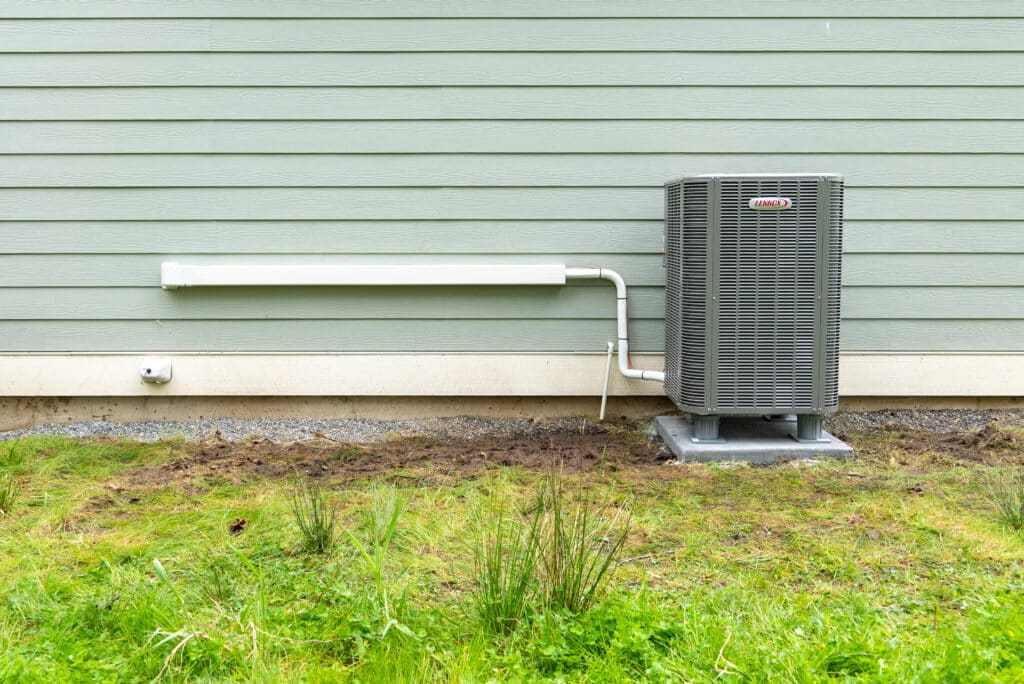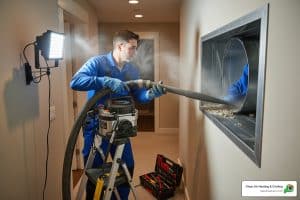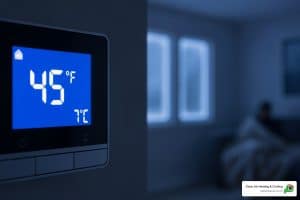Heat pump WA systems are gaining popularity as a smart and efficient choice for homeowners looking to manage energy costs and improve comfort. These eco-friendly devices heat and cool homes using less energy compared to traditional systems. Many Washington residents are turning to heat pumps to reduce their carbon footprint and take advantage of the state’s moderate climate. Here’s why a heat pump could be right for you:
- Dual Functionality: Provides both heating and cooling.
- Energy Efficiency: Uses less electricity than gas furnaces.
- Cost Savings: Lower monthly utility bills.
- Environmental Benefits: Reduces carbon emissions.
Switching to a heat pump system is like making an investment in a greener future for your home and family.
My name is Colin Matei, and as the Owner of Clean Air Heating & Cooling, I have dedicated my career to effective heating and cooling solutions in Washington. My expertise extends to all aspects of heat pump WA systems, and I take pride in delivering top-notch service to our community.

Related Links to Heat Pump WA:
– Heat Pump Bellingham
– Heat Pump Rebates Washington State
Benefits of Heat Pumps in Washington State
Heat pumps are an increasingly popular choice for homeowners in Washington State. Their benefits are hard to ignore, especially when considering energy efficiency, space-saving design, dual heating and cooling capabilities, reduced carbon emissions, and overall convenience.
Energy Efficiency
Heat pumps are champions of energy efficiency. Unlike traditional heating systems that burn fuel to generate heat, heat pumps transfer heat, making them far more efficient. This efficiency translates into significant savings on your energy bills. In fact, a well-maintained heat pump can save you hundreds of dollars each year compared to conventional systems.

Space-Saving Design
A heat pump system can also help you save valuable floor space. Traditional heating systems, like furnaces or boilers, often require bulky equipment that takes up a lot of room. In contrast, heat pumps are compact and can be installed in various configurations to fit your home’s layout. This flexibility means you can enjoy more living space without sacrificing comfort.
Heating and Cooling in One
One of the standout features of heat pumps is their ability to provide both heating and cooling. This dual functionality means you don’t need separate systems for summer and winter. With a heat pump, you can enjoy a comfortable home year-round with a single, efficient system.
Reduced Carbon Emissions
As Washington works towards reducing carbon emissions, heat pumps are an excellent choice for eco-conscious homeowners. These systems produce far fewer emissions than traditional heating methods, helping to lower your home’s carbon footprint. By switching to a heat pump, you contribute to cleaner air and a healthier environment.
Convenience
Finally, heat pumps offer great convenience. They are easy to maintain and provide consistent temperatures throughout your home. Plus, modern systems come with smart thermostats that allow you to control your home’s climate from your smartphone, ensuring comfort at your fingertips.
In summary, heat pumps offer numerous benefits that make them a smart choice for Washington State residents. Their energy efficiency, space-saving design, dual heating and cooling capabilities, environmental friendliness, and convenience make them a top contender for anyone looking to upgrade their home’s HVAC system.
Types of Heat Pumps
When considering a heat pump for your Washington home, it’s important to understand the different types available. Each type has its own unique benefits and is suited to different needs and environments. Let’s explore the main options: air-source heat pumps, geothermal heat pumps, and ductless mini-split systems.
Air-Source Heat Pumps
Air-source heat pumps (ASHPs) are the most common type of heat pump. They work by transferring heat between your home and the outside air. In the winter, they extract heat from the outside air and bring it inside. In the summer, they reverse the process, acting like an air conditioner by removing heat from your home.
Why choose an air-source heat pump?
- Efficiency: ASHPs are known for their energy efficiency, providing up to three times more heat than the energy they consume.
- Cost-Effective: They are generally more affordable to install compared to other types of heat pumps.
- Versatility: Suitable for most homes in Washington, especially those without easy access to water or ground sources.
However, ASHPs might struggle in extremely cold temperatures, which can be a consideration in some parts of Washington.
Geothermal Heat Pumps
Geothermal heat pumps, or ground-source heat pumps, use the stable temperature of the earth to heat and cool your home. They require a series of underground pipes to transfer heat from the ground.
Benefits of geothermal heat pumps:
- High Efficiency: These are the most efficient heat pumps available, as they rely on the consistent underground temperature.
- Long-Term Savings: While the initial installation cost is higher, the energy savings over time can be significant.
- Environmentally Friendly: They have a low carbon footprint and can significantly reduce energy bills.
Geothermal systems are excellent for homeowners who plan to stay in their homes long-term and can manage the upfront investment.
Ductless Mini-Split Systems
Ductless mini-splits are a flexible option for homes without existing ductwork. These systems consist of an outdoor unit and one or more indoor units, providing zoned heating and cooling.
Advantages of ductless mini-splits:
- Flexible Installation: Ideal for homes with no ductwork or for adding climate control to specific rooms.
- Energy Efficiency: By heating or cooling only the areas you need, they can reduce energy consumption.
- Space-Saving: Compact and easy to install, they offer a solution for smaller homes or rooms.
Ductless systems are a great choice for those looking to add heating and cooling to new additions or to retrofit older homes without existing ductwork.
In summary, whether you choose an air-source, geothermal, or ductless mini-split system, each type of heat pump offers unique benefits. Consider your specific needs, budget, and home layout when deciding which heat pump is right for you.
Installation Costs and Rebates
When considering a heat pump installation in Washington State, understanding the costs and available rebates can help you make an informed decision. Let’s break down these factors:
Installation Costs
The cost of installing a heat pump varies widely, influenced by the type of system and the size of your home. On average, installing a heat pump can range from $1,500 to $20,000. Here’s a quick breakdown:
- Ductless Mini-Split Systems: Typically the most affordable, especially for smaller areas. Installation can start as low as $1,500.
- Air-Source Heat Pumps: Generally cost-effective, with installation expenses ranging from $3,000 to $7,000.
- Geothermal Heat Pumps: These are more costly due to the extensive groundwork required, with prices often exceeding $20,000.

Rebates and Incentives
Washington State offers several rebates and incentives to make heat pumps more affordable. The Inflation Reduction Act has introduced new opportunities for energy-efficient upgrades, including heat pumps. Residents can benefit from:
- Standard Rebates: Up to $800 for ductless heat pump installations.
- Low-Income Rebates: As high as $6,000 for qualifying residents through the Free Weatherization Low Income Program.
To qualify for these rebates, ensure your heat pump is installed by a City Authorized Contractor and meets specific installation specifications. It’s crucial to receive written approval before starting any work.
Energy Savings
Investing in a heat pump not only provides comfort but also leads to significant energy savings. Heat pumps are known to be highly energy-efficient, often delivering three times more heating and cooling energy than the electricity they consume. This efficiency translates to lower utility bills, providing long-term savings that can offset the initial installation costs.
In summary, while the upfront cost of installing a heat pump in Washington State can vary, the available rebates and long-term energy savings make it a worthwhile investment. Next, we’ll explore the impact of new building codes and regulations on heat pump installations.
New Building Codes and Regulations
Washington State is taking significant steps to reduce carbon emissions and increase energy efficiency in construction. A major part of this effort is the new building codes approved by the Washington State Building Code Council. These regulations focus on promoting the use of electric heat pumps in new homes, apartments, and commercial buildings.
What Are the New Codes?
The new codes, set to take effect on March 15, 2024, encourage builders to choose electric heat pumps over traditional natural gas furnaces. This is achieved through a scoring system that awards more credits for heat pump installations, making it an attractive option for builders looking to meet code requirements. The goal is to steer construction towards more sustainable and energy-efficient practices.
Legal Challenges
The journey to these new regulations hasn’t been smooth. Legal challenges have been a constant companion, with critics arguing that the codes may not comply with the federal Energy Policy and Conservation Act. This concern stems from a similar case in California, where a court overturned regulations that effectively banned natural gas appliances. Opponents in Washington are worried about similar legal pitfalls, fearing increased costs and potential non-compliance with federal law.
Impact on New Construction
Despite these challenges, the new regulations are seen as a crucial step towards Washington’s ambitious goal of reducing greenhouse gas emissions by 70% by 2031. Builders are incentivized to adopt heat pumps, which are not only energy-efficient but also offer both heating and cooling in a single unit. This dual functionality is particularly beneficial in a state like Washington, where temperature variations can be significant.
The Road Ahead
While the new codes are a bold move towards sustainability, they have sparked a debate on cost implications and federal compliance. The Building Industry Association of Washington has voiced concerns, describing the regulations as a “de facto ban” on natural gas. However, supporters argue that these changes are necessary for a cleaner and more energy-efficient future.
As Washington state steers these legal and regulatory challenges, the focus remains on creating ultra-efficient buildings powered by clean electricity. This shift not only supports environmental goals but also aligns with the growing trend of building electrification across the United States.
Next, we’ll dig into common issues and maintenance tips for heat pumps to ensure they function effectively in various conditions.
Common Issues and Maintenance Tips
Heat pumps are a popular choice in Washington State for their energy efficiency and ability to provide both heating and cooling. However, like any system, they come with their own set of challenges. Here’s a look at some common issues and maintenance tips to keep your heat pump WA running smoothly.
Performance in Cold Temperatures
One of the most common concerns with heat pumps is their performance in cold weather. While modern heat pumps are designed to work efficiently even in cooler climates, extremely low temperatures can reduce their effectiveness. In these conditions, a dual-fuel system that uses a gas furnace as a backup can be a smart choice.
Reliance on Electricity
Heat pumps rely heavily on electricity, which can be a downside if there are power outages or if electricity costs are high. To mitigate this, consider pairing your heat pump with solar panels or a backup generator to ensure continuous operation.
Continuous Running
If your heat pump runs continuously without cycling off, it might be a sign of an issue. This can happen if the system is too small for your home or if there are leaks in the ductwork. Regular maintenance checks can help identify and fix these problems.
Thermostat Issues
A faulty thermostat can cause your heat pump to run inefficiently. If you notice temperature fluctuations or if the system isn’t responding properly, checking the thermostat settings and replacing the batteries can be a quick fix.
Refrigerant Leaks
Refrigerant is essential for the cooling and heating process in heat pumps. If you suspect a leak due to reduced heating or cooling performance, it’s important to have a professional check the system. Low refrigerant levels can lead to higher energy bills and potential damage to the compressor.
Faulty Compressors
The compressor is the heart of your heat pump system. If it fails, the entire system can stop working. Signs of a faulty compressor include unusual noises or the system not heating or cooling effectively. Regular maintenance can help prevent compressor issues by ensuring all parts are working as they should.
Maintenance Tips
To keep your heat pump in top shape, follow these simple maintenance tips:
- Clean or replace filters regularly to ensure proper airflow.
- Inspect and clean coils to maintain efficiency.
- Check refrigerant levels and have them adjusted by a professional if needed.
- Schedule annual maintenance with a licensed technician to catch issues early.
By staying on top of maintenance, you can extend the lifespan of your heat pump and ensure it operates efficiently year-round.
Next, we’ll dive into frequently asked questions about heat pumps in Washington State, addressing their worth, potential downsides, and available rebates.
Frequently Asked Questions about Heat Pumps in Washington State
Is a heat pump worth it in Washington State?
Absolutely! Heat pumps are a great option for Washington state residents. They are energy-efficient, providing both heating and cooling from a single unit. This dual functionality makes them convenient and cost-effective, especially in regions with moderate climates like Washington. By transferring heat rather than generating it, heat pumps can significantly reduce your energy bills.
Moreover, heat pumps improve indoor air quality, making your home more comfortable. Their ability to maintain consistent temperatures throughout the year ensures that you stay cozy in the winter and cool in the summer.
What is the downside to a heat pump?
While heat pumps offer many benefits, there are a few downsides to consider. One major concern is their performance in cold temperatures. In extremely cold weather, heat pumps may struggle to provide adequate warmth. In such cases, a dual-fuel system that includes a backup gas furnace can be a smart solution.
Another factor is the heat pump’s reliance on electricity. If there are power outages or if electricity costs rise, this can affect your heating and cooling. However, pairing your heat pump with solar panels or a backup generator can help mitigate these issues.
Does Washington state have heat pump rebates?
Yes, Washington state offers incentives for installing energy-efficient systems like heat pumps. Under the Inflation Reduction Act, homeowners can take advantage of rebates and tax credits for upgrading to energy-efficient heating solutions. These incentives make installing a heat pump more affordable and can lead to significant energy savings over time.
To qualify for these rebates, it’s important to ensure that your heat pump meets specific efficiency standards and installation specifications. You can find more information on rebates and the application process through your local utility provider or the City of Port Angeles.
By taking advantage of these programs, you not only reduce your upfront costs but also contribute to a greener environment by lowering your carbon footprint.
Next, let’s explore the new building codes and regulations impacting heat pumps in Washington State.
Conclusion
Clean Air Heating & Cooling is committed to providing top-notch service to our customers in Bellingham and the surrounding areas. We understand that choosing the right heating and cooling system is a big decision, and we are here to ensure you make the best choice for your home and family.
Our 25% utility savings guarantee is a testament to our confidence in our services. By choosing us, you’re not only investing in a high-quality service but also in significant long-term savings. Our skilled technicians are trained to install and maintain your heat pump to maximize efficiency, ensuring you get the most out of your investment.
Customer satisfaction is our top priority. We pride ourselves on being prompt and reliable, always showing up on time and ready to help. Our team treats each customer like family, ensuring you feel comfortable and informed every step of the way.
With over 480 5-star Google reviews, our track record speaks for itself. We invite you to experience the difference with Clean Air Heating & Cooling. Let us help you enjoy a comfortable, energy-efficient home while saving money and contributing to a greener planet.
If you have any questions or need assistance, don’t hesitate to reach out. We’re here to help you every step of the way.





